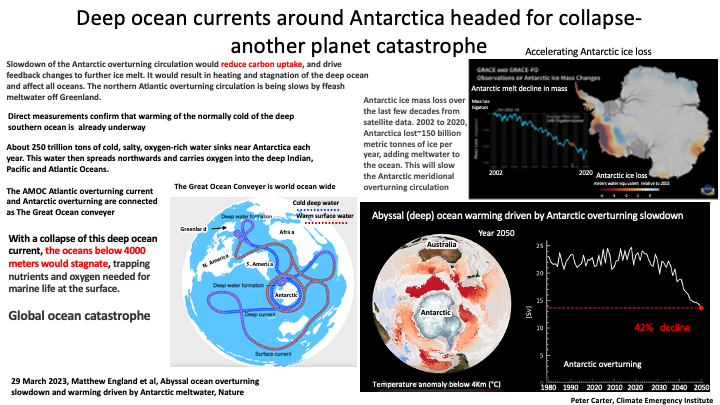
Ice sheet melt water slowing Southern Ocean overturning circulation
The abyssal ocean circulation is a key component of the global meridional overturning circulation, cycling heat, carbon, oxygen and nutrients throughout the world ocean
Highlights
-
Here we use a transient forced high-resolution coupled ocean–sea-ice model to show that under a high-emissions scenario, abyssal warming is set to accelerate over the next 30 years.
-
These results highlight the critical importance of Antarctic meltwater in setting the abyssal ocean overturning, with implications for global ocean biogeochemistry and climate that could last for centuries.
AI generated version
The Abyssal Ocean Circulation: Implications for Global Ocean Biogeochemistry and Climate
The global ocean plays a crucial role in regulating Earth's climate, storing vast amounts of heat and carbon dioxide. One key component of the global ocean circulation is the abyssal ocean circulation, which cycles heat, carbon, oxygen, and nutrients throughout the world ocean. However, recent research suggests that the abyssal ocean circulation may be at risk of accelerating under high-emissions scenarios, with potentially significant implications for global ocean biogeochemistry and climate.Using a transient forced high-resolution coupled ocean–sea-ice model, researchers have shown that abyssal warming is set to accelerate over the next 30 years under high-emissions scenarios. The results highlight the critical importance of Antarctic meltwater in setting the abyssal ocean overturning, with implications for global ocean biogeochemistry and climate that could last for centuries.The ocean overturning circulation is driven by differences in temperature and salinity, with cold and dense water sinking in the North Atlantic and Southern Ocean, and warmer water rising to the surface in the tropics. This process is known as the thermohaline circulation, and it plays a key role in regulating Earth's climate by transporting heat and carbon dioxide from the surface to the deep ocean.The abyssal ocean circulation is the part of the thermohaline circulation that occurs in the deep ocean below 2,000 meters. This circulation is driven by the sinking of dense water masses in the North Atlantic and Southern Ocean, which then flow along the ocean floor to mix with water from other regions, before rising back to the surface in the Southern Ocean. The abyssal ocean circulation is crucial for transporting heat, carbon, oxygen, and nutrients throughout the world ocean, and it plays a key role in regulating the Earth's climate.However, recent research suggests that the abyssal ocean circulation may be at risk of accelerating under high-emissions scenarios. The new study used a high-resolution coupled ocean–sea-ice model to simulate the impacts of climate change on the abyssal ocean circulation. The model was forced with a high-emissions scenario, known as Representative Concentration Pathway 8.5, which assumes continued high emissions of greenhouse gases throughout the 21st century.The results showed that under this scenario, abyssal warming is set to accelerate over the next 30 years. This is because the increased melting of Antarctic ice shelves is adding more freshwater to the Southern Ocean, which in turn is reducing the salinity of the dense water masses that sink to the abyssal ocean. This reduction in salinity makes the water less dense and less likely to sink, which in turn reduces the strength of the abyssal ocean circulation.These results have important implications for global ocean biogeochemistry and climate. The abyssal ocean circulation plays a crucial role in cycling nutrients, carbon, and oxygen throughout the world ocean, and any changes to this circulation could have significant impacts on marine ecosystems. Additionally, the abyssal ocean circulation is a key component of the global ocean heat and carbon uptake, and any reductions in this uptake could have significant impacts on global climate.Overall, this study highlights the need for urgent action to reduce greenhouse gas emissions and mitigate the impacts of climate change on the global ocean. The abyssal ocean circulation is a critical component of the Earth's climate system, and any disruptions to this circulation could have significant and long-lasting impacts on the world ocean and the climate system as a whole.